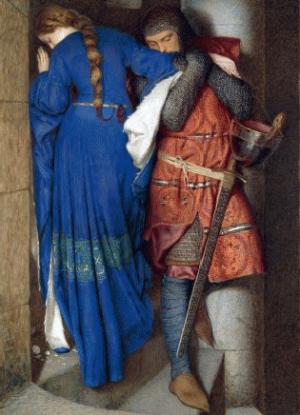Life
| 1816-1900; b. 18 April, Corofin House, Co. Clare; ed. RDS Schools; began exhibiting at RHA, with Abraham on his Journey to Sacrifice Isaac, 1830; practised as miniature portraitist in Dublin; friend of Samuel Lover, in his capacity as miniaturist; befriended by Petrie, who may have met him while he was sketching in a Dublin Gallery; RHA 1839; designed the frontispiece of The Spirit of the Nation in 1845 for Thomas Davis [engraved by Carolyn Millard]; studied in Germany, living in Munich, 1851-58; FSA 1863;. Dir. National Gallery, London, 1874-94; |
| Added 600 valuable paintings to the collection, including Leonardo’s Virgin on the Rocks, Botticelli’s Venus and Mars, and Raphael’s Ansi dei Madonna; there is a portrait by George Francis Mulvany in the National Gallery of Ireland; travelled to West of Ireland with George Petrie, painting peasant life, including his canvas, “Aran Fisherman’s Drowned Child” (1838-1841); also “The Blind Girl at the Holy Well”, 1840; drew Mangan’s features in chalk immediately after his death at Meath Hospital, having been summoned by William Stokes who recognised him being carried into hospital, 1849; |
| knighted 1884; LLD TCD, 1896; besides Mangan, his Irish subjects incl. Charles K. Bushe; a pencil sketch of Davis; Eugene O’Curry, drawing with Sir Samuel Ferguson, as well as a chalk sketch of William Stokes (both in the NGI); painted celebrated portrait of George Eliot; best-remembered today for “Hellelil and Hillebrand: The Meeting on the Turret Stairs”, a romantic image of Norman days - a painting which was voted favourite Irish painting on an RTE poll, 14 May 2012. ODNB DIB DIH BREF |

[ top ]
Commentary
Marie Bourke, ‘Rural Life in Pre-Famine Connacht, A Visual Document’, in Ireland, Art into History, ed. Brian Kennedy and Raymond Gillespie(1994), pp.61-74. This is chiefly an account of Burton, his connection with Petrie and the Aran Islands, and his painting ‘Aran Fisherman’s Drown Child’, characterised as ‘part of a search for a “national identity”.’ (p.63); told Davis that ‘free spiritual, high-aiming art cannot be forced’; Thackeray wrote, ‘The drawings and reputation of Mr Burton are well known in England, his pictures were the most admired in the Collection’, reflecting the wide-spread acclaim that greeted his ‘Drowned Child’ when shown first at the RHA exhibition in 1842; also shows influence of ‘A Scene from Gil Blas’ painted by Daniel Maclise, 1839.
[ top ]
References
Dictionary of National Biography calls him a portrait painter in Dublin; lived in Munich, 1851-58; FSA 1863; dir. National Gallery, London, 1874-94; LLD TCD, 1896; portrait of George Eliot; best known for ‘The Meeting on the Turret Stairs’ [NOTE, a picture characterised by Paul Durcan in Crazy About Women, 1991].
Brian de Breffny, ed., Ireland: A Cultural Encyclopaedia (London: Thames & Hudson 1982), reproduces “Aran Fisherman’s Drowned Child” ( c.1841).
[ top ]
Notes
Irish portraits by Burton incl. besides Mangan, Charles K. Bushe; Davis, pencil; Eugene O’Curry, drawing, with Sir Sam. Ferguson [provenance, Henry Stokes; NGI]; Will. Stokes chalk NGI. See Anne Crookshank, ed., Great Irishmen and Women Portrait Exhibition [Catalogue] (Ulster Museum 1965)].
Samuel Ferguson’s Congalis dedicated to F. W. Burton along with Whitley Stokes, Margaret Stokes, ‘three much prized friends’. A letter of thanks from Burton is printed in Lady Ferguson’s life of her husband (1896).
[ top ]